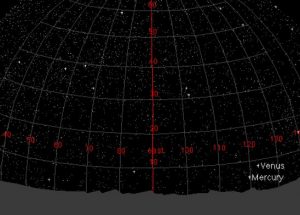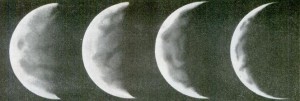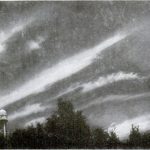It’s still dark in the mornings when I get up, but the days are gradually getting longer at both ends. In a few weeks I’ll be getting up after the dawn rather than before it. And Venus is getting harder to spot as it drops closer and closer to the horizon in the southeast but for now when the sky is clear I can still pick it out through the trees. Soon I won’t be able to see it at all. And maybe that’s not a bad thing.
I wonder sometimes what the ancient Greeks and Romans were thinking when they named the planets. Was it just a lucky guess that they named the largest planet in our solar system Jupiter? Maybe not—it’s the fourth brightest object in our sky, after the Sun, the Moon, and Venus. But since Venus is brighter why didn’t they call it Jupiter? I guess they named it after the goddess of love because they thought it was so beautiful. Looks can be deceiving. If they knew about the nightmare landscape below those clouds where the temperatures average more than four-hundred degrees Fahrenheit and there are blizzards of sulfuric acid snow they might not have thought it was all that beautiful. In Arthur C. Clarke’s Rendezvous With Rama almost every planet in the solar system has human colonies. Even Neptune has an outpost on its moon Triton. The exception is Venus. Oh, and Pluto, since it was still considered a planet when the book was first published, but that’s another story.
That’s science fiction. Here’s a little science fact: when Galileo turned his telescope toward Venus he noticed it, like the Moon, had phases. That was his first clue that the Earth revolves around the Sun rather than the other way around, something that was a slightly controversial idea at the time.
Anyway as our own planet spins around the Sun and the mornings come earlier Venus will disappear from my morning sky and I won’t think about it so much anymore. I’ll have to think about other things, like maybe putting on some pants in case the neighbors are looking.








I’ve always thought Venus’ caustic conditions were rather apt considering just how quickly the members of the old pantheons could fly into a murderous rage if they got the tiniest notion that they’d been slighted.
That’s brilliant and something I’d never thought of. And, yeah, the Olympians were a feisty lot. What started the whole Trojan War? A golden apple.
When it comes to the naming of the planets, I always ask “So what’s up with Uranus?” Then I laugh like I’m 6. Man, that never gets old. Sorry–I may or may not have had a couple of glasses of wine at this point…
Another glass of wine and you’d be asking, “What’s up Uranus?”, right? And when the Voyager II spacecraft sent information back from that particular gas giant–seriously, it’s the joke that keeps on giving–I know the astronomers couldn’t stop themselves from laughing every time they said “Uranus is pretty boring”.
Consider this: the word ‘Earth’ came from the Anglo-Saxon word ‘erda’ and it’s germanic equivalent ‘erde’ which means ground or soil. In Old English, the word became ‘eor(th)e’ or ‘ertha ‘. There is speculation that the origins of the word may be from an Indo-European language base ‘er’ which produced more modern adaptations of the word used in languages today. What is certain though is of all the Planet’s names, Earth is the only one in our solar system that does not come from Greco-Roman mythology. All of the other planets were named after Greek and Roman gods and goddesses. In another words, the name of our planet means ‘ground or soil’, so ‘dirt’ is the first thing that comes to my mind. ?
That is interesting and made me consider something I hadn’t thought about before. Earth, as far as we know, is the only planet currently sustaining life and the whole planet is suffused with life. The very ground we walk on is organic material that’s constantly being cycled through living things. The other planets have organic compounds but those compounds are mostly more static than they are here. There’s something to think about.